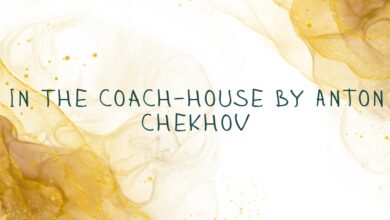
Goat-Feathers by Ellis Parker Butler
No human being ever tells the whole truth about himself. We seem to be born liars in that particular, all of us, and I am no different. I’m starting out now to tell the bitter, agonizing truth about myself, but before I am through I shall probably be lying at the rate of a mile a minute and cracking myself up something awful! A man can tell only so much truth; then he begins to wabble.
The truth is, I ought to be making as much money as Robert W. Chambers, and winning prizes of honor like Ernest Poole, and I’m not. I ought to be better known as a humorist than George Ade and Mark Twain rolled into one, and I’m not. The trouble with me is that I am always too ready and eager to break away and go gathering goat-feathers. If it had not been for that I might be a millionaire or the President of the United States or the leading American Author, bound in Red Russia leather. I might have been a Set of Books, like Sir Walter Scott or Dickens or Balzac, and when people passed my house the natives would say, “No, that isn’t the city hall or the court-house; that’s where Butler lives.” Of course some strangers would say, “Butler, the grocer?” but that would be the ignorant few. The real people would whisper, “Butler, the Author!” in a sort of subdued awe and remove their hats. Some of them would pick a blade of grass from my lawn and take it home to hand down to their children’s children as the most treasured family possession. As it is, I have gathered so many goat-feathers that half the people introduce me as Ellis Butler Parker and the other half as Butler Parker Ellis, and if there is a ton of hay growing on my lawn nobody bothers to pick a pint. My father has to cut it and rake it away.
Goat-feathers, you understand, are the feathers a man picks and sticks all over his hide to make himself look like the village goat. It often takes six days, three hours and eighteen minutes to gather one goat-feather, and when a man has it and takes it home it is about as useful and valuable to him as a stone-bruise on the back of his neck. I have recently spent several days over a month gathering one goat-feather, and as a reward I was grabbed and chased after another that ate up two weeks and three days of my time. Goat-feathers are the distractions, side lines and deflections that take a man’s attention from his own business and keep him from getting ahead. They are the Greatest Thing in the World–to make a man look like a goat.
I think I can claim, without fear of dispute, to have gathered more goat-feathers in a fifty-year career, and to look more like a goat, than any other man living, and not excepting Pooh Bah, who added such a pleasing, goat-like character to Gilbert-and-Sullivan’s “Mikado.” Pooh Bah, poor amateur! could boast only that he was First Lord of the Treasury, Lord Chief Justice, Commander-in-Chief, Lord High Admiral, Master of the Buck Hounds, Groom of the Back Stairs, Archbishop of Titipu, Lord Mayor, Lord Chamberlain, Attorney-General, Chancellor of the Exchequer, Privy Purse, Private Secretary, Lord High Auditor, First Commissioner of Police, Paymaster General, Judge Ordinary, Master of the Rolls, Secretary of State for the Home Department, Groom of the Second Floor Front, and Registrar. I can beat that all to pieces.
When I wake in the morning as President of the Authors’ League Fund I can give some attention to my work as Publicity Manager of the Liberty Loan Committee while preparing to devote an hour or two to the Secretaryship of the Armenian Relief and the Treasurership of the Volunteer Committee for the Fatherless Children of France, before I consider my duties as Vice-President of the Flushing Savings and Loan and as Vice-President, Director and Member of the Discount Committee of the Flushing National Bank. As a Councillor and Member of the Executive Committee of the Authors’ League, and one of the Membership Committee of the City Club, Governor of the Tuscarora Club and Publicity Manager for the Flushing Red Cross, Flushing Red Cross Drive and Queensboro Red Cross Drive I can put in a few hours of goat-feather gathering. Night may come without my having to do any real work, but if not I can avoid it and accumulate a few more goat-feathers as Member of the Book Committee and Executive Committee of the Queensboro Public Library, Member of the Queensboro Committee on Training Camp Activities, Executive Committeeman of the Vigilantes, Authors’ Committeeman of the American Defense Society, and so on for hours and hours and hours. I am a member of everything but the Mothers’ Club of Public School 20, and everything takes time from my legitimate work. I estimate that in the last twenty years I have gathered twenty thousand pounds of goat-feathers at a cost of about five dollars a pound, and the whole lot is worth about twenty cents.
What I marvel at is that I make a living at all. My telephone rings seven thousand eight hundred and six times a day, and only once in the last eight years has it been rung by any one who wanted to buy a story from me. The other eighty-two million times it was rung by people who wanted me to gather a new crop of goat-feathers.
At one time I moved out to the barn to get away from the telephone. The result was that I had to come down out of the second story of the barn, walk across my property, enter the house, and go upstairs every time the telephone rang. I did this eighty-two times a day, and then moved back to the house and had an extension telephone put in my workroom so close to my desk that every time I flexed a muscle I knocked the ‘phone off its table. This made it much handier for the goat-feather distributers, so they called me up oftener. They call me before I am out of bed, when I am in the bathtub, and after I go to bed. Usually they call me to the ‘phone and then tell me to wait a minute until Mr. Jonesky comes. The favorite times for calling me are when I am in the bathtub, when I am at meals, and when I am trying to concentrate on my writing.
I am not blaming any one for this. I did not have to rent a telephone. I could have let people come to the house. A great many do come to the house. On the average, it takes the person who comes to the house just one hour to state a proposition that could be put in a six-word telegram or ‘phoned in one minute. The visitor always begins with a few neat remarks about “Pigs and Pigs,” which is not the name of the story, tells how his grandmother laughed over it until she swallowed her false teeth, explains that his grandmother was one of the Tootlecoms of Worcester, but married into the Blahblah family. About half an hour later the visitor remarks, “I know you are very busy and I hate to ask you, but—-” Then he asks me to do some little trifle like raising $80,000,000 in Flushing for the War Fund of the One-Legged Gardeners’ League, which has a plan for planting sweet peas in the trenches in Mesopotamia. “We know you can do it,” he says pleasantly. I know I can do it, too. I feel the great urge of ability rise within me. I don’t care a hang for Mesopotamia, or for sweet peas in the trenches there; but it is something I can do, and I go ahead and do it. I gather two quarts of red, white, and blue goat-feathers, give eighteen magazine editors a chance to forget I am alive, and find at the end of the month that I am three hundred and forty dollars deeper in debt than I was before.
It has come about that people are actually offended if I don’t jump into every mad goat-feather quest that is proposed. I am firmly convinced that there is now extant an Association to Prevent Butler Doing a Full Day’s Work. I don’t want to seem egotistical, but I am now of the opinion that the Kaiser started the war in order to make it seem necessary for me to make Four-Minute speeches on Food Conservation, Give Your Binoculars, and Buy a Thrift Stamp.
Of course, all our patriotic, Liberty Loan, Red Cross, Thrift Stamp side-lining isn’t goat-feathering. The genuine variety is eagle-feather gathering, and I am as proud of my eagle-feathers as I am sour on my goat-feathers.
Now it is a fine thing to be treasurer of the Flushing Hospital, and it is a fine thing to be president of the Flushing Country Club, but the goat-feathers pall when you know that the reason you were given those glories was because nobody else would take them. It’s a “grand and glorious feelin'” to know you can take some affair and make it a success, or a near-success; but it is not business. A man may make a success of a Flushing Public Playground and not be making a success of himself. He may be making a goat of himself. The chances are ten to one that he is making a goat of himself.
I’ll never get the Pulitzer prize for the best novel or for the best play, but if there was a Pulitzer prize for the greatest human goat nobody else would be in the running. I have not got goat-feathers by the dozen or by the pound–I have them by the bale. I estimate that if all my goat-feathers were placed end to end they would reach from the bread line to the poor-house.
It is just possible that by this time you may gather that I have a grouch on myself. If so, you are right. To-day I am forty-nine years and six months old, and as a bright and shining literary light I am exactly where I was twelve years ago. I am twelve years older and have that much less time in which to complete the joy of making good as one of the great American authors. Presently the infirmities of age will begin to gnaw at me, the moths will ruin my flossy collection of goat-feathers, all those who now pat me on the back because they can make use of me free of charge will forget that I am alive, and my executors will shake their heads and say, “Ain’t it too bad he left so little!”
Distraction isn’t really good for a man if he wants to reach a goal. No salesman ever got very far by carrying too many side lines. The poorest sort of monopoly for any man to undertake is a monopoly of goat-feathers.
No man in the world had a better chance to make himself the Great American Humorist than I had when I wrote “Pigs is Pigs.” I had a good, solid foundation of fairly good humorous work under it and the little story had a wonderful success. The thing for me to have done then was to stick to humor, regardless of anything. I have written dainty stories, sympathetic stories, serious stories, all kinds of stories, but not many humorous stories. It is surprising how often editors have had to announce “A story that shows this famous humorist in an entirely new vein.”
Taking literature as a business, I can say that a humorist should have no “new vein.” Neither does a plumber succeed as a plumber by spending a large share of his working hours making violins. No one ever succeeds by allowing himself to be deflected from the most important business of life, which is making the most of the best that is in him. Even a cow does better if she sticks close to the business of eating grass and chewing the cud. When she starts in to learn to whistle like a catbird and to flit from field to field like a butterfly it is safe to say she is no longer a success in life. When a cow strays from plain milk-producing methods and begins climbing trees and turning somersaults, she may be more picturesque, but she is gathering nothing but goat-feathers. Seven farmers, a school-teacher and a tin peddler may line up along the fence and applaud her all afternoon until she is swelled with pride, but when she gets back to the barn at sundown she will not give much milk. She will not be known as a milch cow long; she will be a low grade of corned beef, a couple of flank steaks and a few pairs of three-dollar shoes.
I can sit down to write a story about a man who fell off a bridge and landed in a kettle of tar on a canal boat and, before I have completed a full paragraph, I can have stopped to clean the small o, small e, and small a of my typewriter with a toothpick, stopped to think about the pearl buttons on a vest I owned in 1894, the Spanish-American War, what the French word for “illumination” is, and whether I paid my last Liberty Loan installment. Before I have finished that first paragraph I may have stopped to fill my fountain pen, gone downtown to attend a meeting of the Red Cross Committee, started to recatalogue my published stories, and taken a trip to Chicago. Before I have got to the first period in the first sentence I may have decided that I would not have a man fall off the bridge but have a woman fall off it, that I would not have her fall off a bridge but off the Woolworth Building, that I would not have her fall into a kettle of tar but into a wagonload of feather beds, that I would not have her fall at all, that I would not write a humorous story at all, that I would not write at all, and that I would, instead, get an empty cigar box and make a toy circus wagon for my young son.
I once made an entire doll’s house, two stories, four rooms, kitchen and bath, with hand-carved stairways and electric lighting throughout, the walls entirely weatherboarded, put in the carpets, papered the walls, hung lace curtains at the windows and painted the exterior, and all between two paragraphs of a story. I spent three months on that little trip after goat-feathers, and in the meantime Arnold Bennett probably wrote three novels of several hundred thousand words each, gained an international reputation, and passed me on the road to fame like an airplane passing a snail. George Ade kept pegging away at his “Fables” with the regularity of a day laborer, and Peter Finley Dunne ground out his “Mister Dooley” like an unwearied sausage-grinder.
On my wall, alongside my desk, I have a calendar, and the sheet that faces me is that for the first week in March, 1916. It says “Concentration. Concentrate all your thoughts upon the work in hand. The sun’s rays do not burn until brought to a focus. Alexander G. Bell.” That is the whole matter in a nutshell, but the only use the motto has been to me has been to permit me to look at it and think about it when I ought to be thinking of the story I was trying to write.
So far as I am concerned, the most important person in the world is myself. The most important success in the world is my success. The most important money in the world is my money. A whole lot of the most important debts in the world are my debts. The same is true of you and your success and your money and your debts.
I hope you are not near fifty years old. I hope you are nearer twenty, but whatever your age I can tell you that chasing after goat-feathers is mighty poor business. The time to investigate interesting by-paths is when you are on a vacation, but the New York-Chicago Express gets there by staying on the track. The minute it starts climbing some interesting country lane after daisies and buttercups the coroners begin to gather and the claim agents flock together, and some slow but sure old freight train, plugging along on the next track but sticking to it, toots a couple of times and passes by.
If I am ever the boss of a school board I shall insist that no child graduate until he can foot correctly a pile of numbers four deep and forty high, and do it the first time. I have been a bookkeeper in my day, and I have footed a column of figures twenty times and got ten different results. I can go up a column of figures, starting like a race horse–“Seven and six are thirteen, and five are eighteen, and two are twenty, and–and I wonder if I put a stamp on the letter I mailed this morning–I wonder if Bacon wrote Shakespeare’s plays–I wonder if a bomb from an airplane would go through from the roof of my house to the cellar–cellar–cellar–well, I’m glad I’ve got eight tons of coal in, but I’ll have to get more in as soon as I can–and six—-” Then I have to begin at the beginning again with “Seven and six are thirteen, and five are eighteen—-“
The reason children don’t get their examples right in school is because they don’t concentrate on the matter in hand, and the reason men don’t get their lives right is because they don’t concentrate on the matter of making good at what they know is the business of their lives–success. If you stop a moment and think of the men you know who are not successes, but who might be successes, you will find they are goat-feather gatherers. Anything that leads a man aside from the straight path to his goal is a goat-feather. Every useless side line is a goat-feather. Every unnecessary distraction is a goat-feather. Nine tenths of the things I do are goat-feathers.
I don’t mind telling you that I consider myself a very, very wonderful man. Nobody but a most remarkable man could spend so much time in the goat-feather groves gathering goat-feathers and still keep his family from starvation. I actually gasp when I think what a great man I should have been if I had stuck to business instead of being drawn aside by every sweet odor and pleasant sound. Then I actually swear when I think how many hours and days and weeks I have given to making myself look like a cross between a llama and a stuffed owl, when I might have been writing things the editors never have enough of, and buy as soon as they read the first paragraph.
It is all right! I’m not jealous! I’ll sit in the front row every time Ade or Tarkington or Chambers pulls a success, and I’ll applaud as whole-heartedly as any one, but I reserve the right to kick myself when I get outside. This article is one of the kicks, and I hope it will have a good effect on me. I hope it will teach me a lesson. I doubt it; I’m too old; I’m too accustomed to chasing goat-feathers to give it up now.
So there you have the story of what is the matter with me. You know now why, when you think of me, you think of a story I wrote twelve years ago. I had a main goal, but I liked too well to investigate all the cross-roads instead of keeping straight on. That’s bad; that’s gathering goat-feathers. It has been bad for me, and bad for my success as an author, and bad for my success in the only life I have to live, but it is apt to be much worse for you to gather goat-feathers than for me to gather them, because I can, occasionally, weave some of them into a story, while you can’t do anything at all with those you acquire.
The time we waste in excursions off the main line of our road to our goal is the difference between success and half-success; often it is the difference between success and failure.





